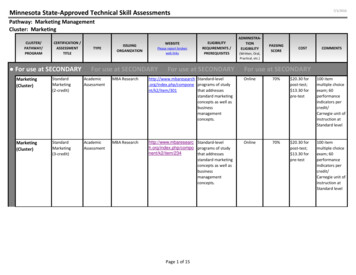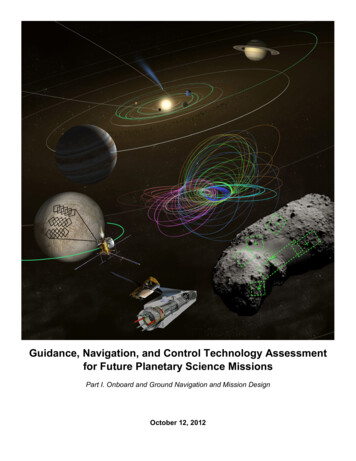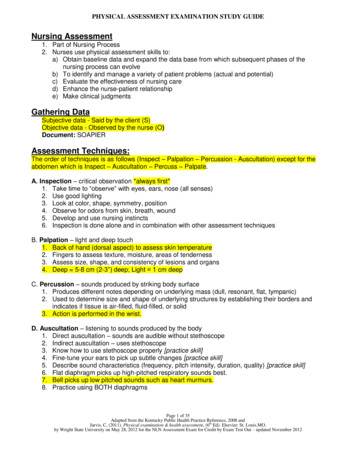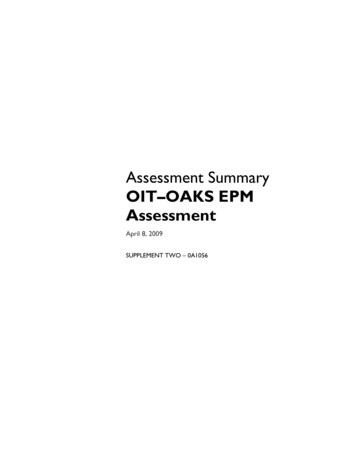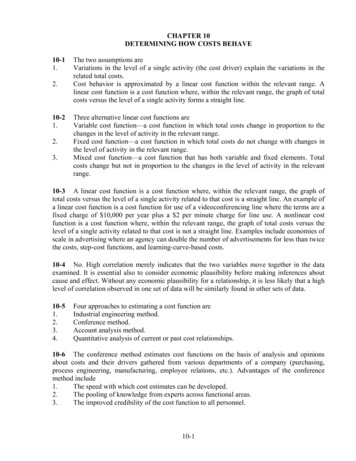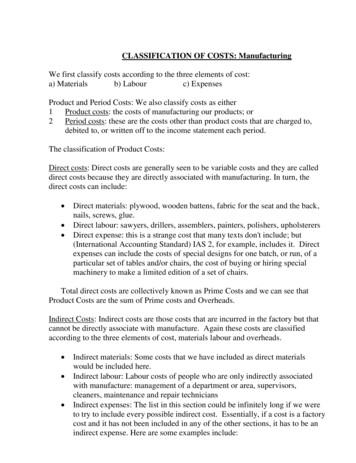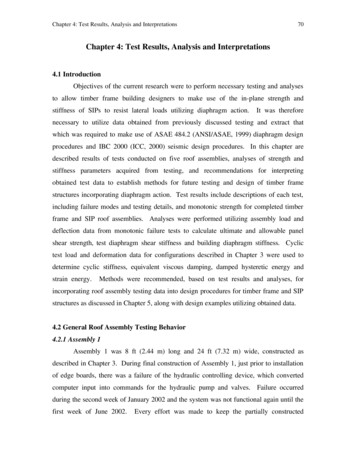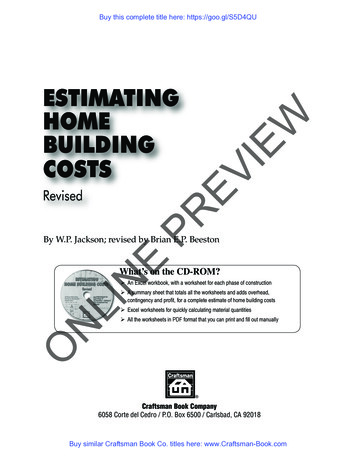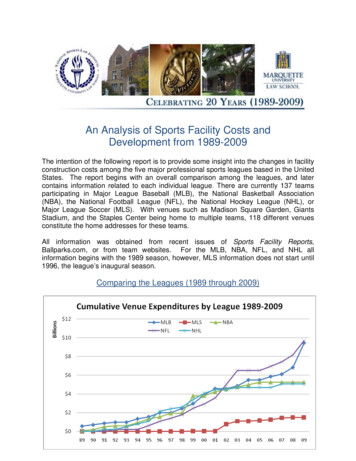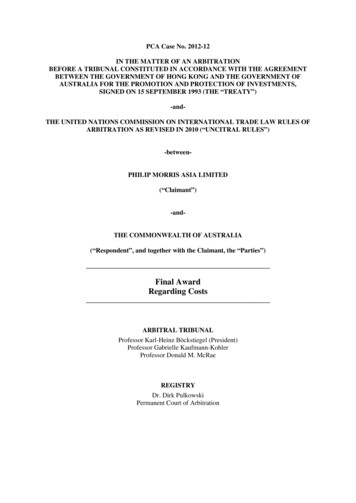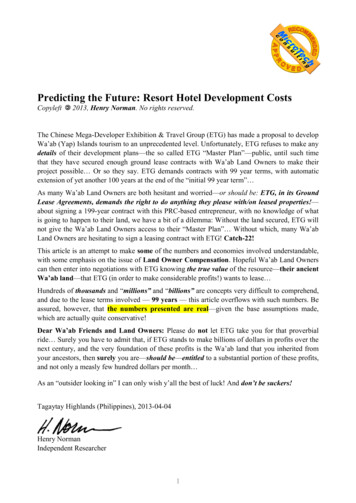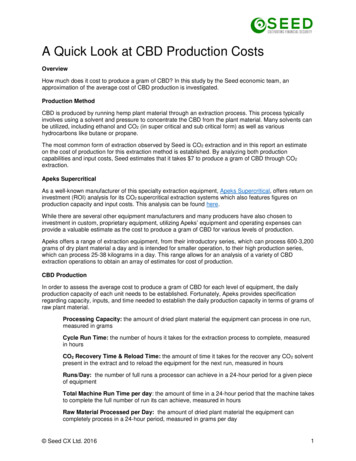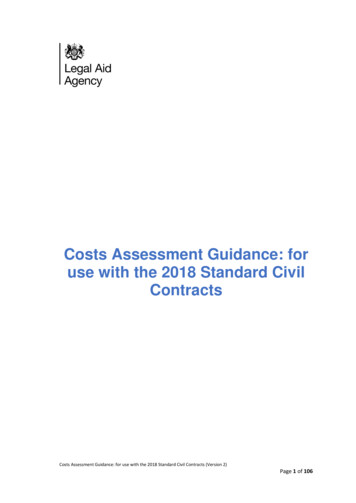
Transcription
Costs Assessment Guidance: foruse with the 2018 Standard CivilContractsCosts Assessment Guidance: for use with the 2018 Standard Civil Contracts (Version 2)Page 1 of 106
Version:Issue date:Last review date:Owned by:4February 2021January 2021Central Legal TeamVersion: Date1234ReasonSeptember2018Initial PublicationJuly 2020Amendments to s.14 and s.15 to reflect changes to theLAA’s assessment limits.Amendments to paragraphs 4.10 and 5.29A of Appendix 1to clarify circumstances in which a level 2 fixed fee may bepaid and to reflect temporary changes regarding claims forpayments on account.January2021February2021Amendments as a result of the UK exiting the EU.Amendments to extend the temporary changes regardingclaims for payments on account.Costs Assessment Guidance: for use with the 2018 Standard Civil Contracts (Version 2)Page 2 of 106
ContentsPart A: All contract work1.2.3.4.5.General PrinciplesChargeable workDisbursementsVATWork relating to the Proceeds of Crime Act 2002Part B: Controlled work6.7.8.9.Civil Legal Aid RegulationsEscape fee casesHousing Possession and Homelessness CasesDisbursementsPart C: Licensed work10. The legal aid certificate11. Costs limitations12. Enhancement of costs13. Counsel’s fees14. The Legal Aid Agency’s assessment limits15. The assessment process16. The legally aided client’s rights on assessment17. Detailed assessment and appeals from detailed assessmentAppendix 1: Family Fee Scheme Guidance (Excluding Advocacy)1.2.3.4.5.6.Family Fee Scheme Guidance (Excluding Advocacy)Categories of workLegal help (level 1)Family help (lower) (level 2)Private Family Law Representation Scheme (PFLRS)Care Proceedings Graduated Fee Scheme (CPGFS)Appendix 2 – Guidance on the Family Advocacy Scheme (FAS)Costs Assessment Guidance: for use with the 2018 Standard Civil Contracts (Version 2)Page 3 of 106
nitionsNature of the FASScope of the schemeExclusions from the schemeWhat work is included in the schemeNature of payments under the schemeHigh Cost Case ContractsLegal aid certificatesCategories – generallyCategories – what does each category include?Categories – mixed categoriesCategories – what is a single set of proceedings?Activities – what are activities?PaymentAssessmentCosts Assessment Guidance: for use with the 2018 Standard Civil Contracts (Version 2)Page 4 of 106
Part A: All Contract Work1.General PrinciplesThis version of the Costs Assessment Guidance is for use in conjunction with the 2018Standard Civil ContractIn this section, the following expressions have the following meanings:“the Contract” means the 2018 Standard Civil Contract.“the Specification” means the 2018 Standard Civil Contract Specification“The Act” or “LASPO” means the Legal Aid Sentencing and Punishment of Offenders Act 2012“Costs Regulations” means the Civil Legal Aid (Costs) Regulations 2013“Procedure Regulations” means the Civil Legal Aid (Procedure) Regulations 2012“Merits Regulations” means the Civil Legal Aid (Merits Criteria) Regulations 2013“Remuneration Regulations” means the Civil Legal Aid (Remuneration) Regulations 2013.“Financial Regulations” means the Civil Legal Aid (Financial Resources and Payment forServices) Regulations 2013“Statutory Charge Regulations” means the Civil Legal Aid (Statutory Charge) Regulations 2013“the Director” means the Director of Legal Aid Casework as designated by the Lord Chancellorunder Section 4 of LASPO.“Standard Fee” and “Graduated Fee” have the definitions as set out in the Specification.Introduction“CCMS” means the LAA’s online Client and Costs Management SystemThis guidance applies from 1 September 2018 to civil matters and cases governed by the 2018Standard Civil Contract. It is also relevant to any cases run under an Individual Case Contract.This guidance relates primarily to services payable at hourly rates under the terms of theSpecification, including any notional assessment of the costs of a case or matter paid as aStandard or Graduated Fee, and is the Guidance/Contract Guide referred to in Paragraph 6.9of the Specification. The rules concerning Standard and Graduated Fees under controlledwork are set out in Section 4 of the Specification. The guidance does not apply to work carriedout under previous Contract Specifications. Previous guidance continues to apply to suchcases.Costs Assessment Guidance: for use with the 2018 Standard Civil Contracts (Version 2)Page 5 of 106
Prior authorities have an important role in cost assessment. Our guidance on authorities canbe found in the “Narrative and guidance: public funding” document c Framework1.1.The Lord Chancellor through the Legal Aid Agency (“the Agency”) is obliged to payremuneration for civil cases properly due in accordance with the RemunerationRegulations 2013 and his/her contracted obligations.1.2.Work is remunerated according to time spent by a fee earner at the relevant hourlyrate. The rates are set by the Lord Chancellor in the Remuneration Regulations. Therates in the Remuneration Regulations cover all civil matters or cases commencedunder the Contract save for those that become subject to an Individual Case Contractwith the Lord Chancellor.The approach to assessment1.3.Many of the basic principles governing assessments are contained in the CivilProcedure Rules introduced in April 1999 and the Civil Procedure (Amendment) Rules2013 which provide the general framework for dealing with costs, including the courts’discretion in the making of costs orders, the form and process of detailed assessment,and the basis, and criteria for quantification of costs. In particular, all assessments ofContract Work as payable by the Agency are to be carried out on the standard basissubject to the provisions of the Specification, the Regulations and this Guidance (seeParagraph 6.9 of the Specification).CPR 44.3(2) states that:“Where the amount of costs is to be assessed on the standard basis, the court will—(a) only allow costs which are proportionate to the matters in issue. Costs whichare disproportionate in amount may be disallowed or reduced even if theywere reasonably or necessarily incurred; and(b) resolve any doubt which it may have as to whether costs were reasonablyand proportionately incurred or were reasonable and proportionate inamount in favour of the paying party.”Under CPR 44.4:“(1)The court will have regard to all the circumstances in deciding whether costswere—(a)if it is assessing costs on the standard basis—(i)(ii)(b)proportionately and reasonably incurred; orproportionate and reasonable in amount, orif it is assessing costs on the indemnity basis—(i)unreasonably incurred; orCosts Assessment Guidance: for use with the 2018 Standard Civil Contracts (Version 2)Page 6 of 106
(ii)unreasonable in amount.(2)In particular, the court will give effect to any orders which have already beenmade.(3)The court will also have regard to—(a)the conduct of all the parties, including in particular—(i)(ii)conduct before, as well as during, the proceedings; andthe efforts made, if any, before and during the proceedings inorder to try to resolve the dispute;(b)the amount or value of any money or property involved;(c)the importance of the matter to all the parties;(d)the particular complexity of the matter or the difficulty or novelty ofthe questions raised;(e)the skill, effort, specialised knowledge and responsibility involved;(f)the time spent on the case;(g)the place where and the circumstances in which work or any part of itwas done; and(h)the receiving party’s last approved or agreed budget.”1.4The assessment of costs payable under legal aid should operate on the same principleswhether the assessment is carried out by a costs officer of the court or by an assessorof the Agency, the object in all cases should be to achieve a fair assessment of thecosts due to the provider under the Contract. The question of whether costs arereasonable and/or proportionate is to be resolved on an objective basis having regardto all relevant circumstances, and particularly the matters listed in CPR 44.4(3). Itshould not be influenced by the Lord Chancellor also being the paying party, beyondthe fact that resolution of genuine doubts are to be resolved in the Lord Chancellor’sfavour under CPR 44 .3 (2)(b).1.5The primary document in assessing costs is the bill of costs or the claim formsubmitted, which sets out the items and amounts being claimed. Items not appearingin the bill or claim form will not be paid.1.6Assessment of fee-earner’s costs involves making a judgment, having regard both tothe bill and to supporting documents provided and all relevant circumstances, as towhether, in respect of individual items of work and the case/matter as a whole:(a)the work done;(b)the time taken;(c)the remuneration rates applied;Costs Assessment Guidance: for use with the 2018 Standard Civil Contracts (Version 2)Page 7 of 106
(d)any enhancement claimed;is in accordance with the provisions of the Contract and Regulations reasonable andproportionate. Assessment of disbursements is considered further at section 3 below.Work done1.7Allowance is only made for work claimed where it is supported by appropriateevidence on the file. The onus is on the provider to supply evidence on the file that thework was done.1.8The assessor is not to take into account hindsight but is to try to view the question ofwhat is reasonable from the perspective of the average competent fee-earner doinghis or her best for his client at the particular time when the work was done.“When considering whether or not an item in a bill is “proper” the correct viewpointto be adopted is that of a sensible solicitor sitting in his chair and considering what inthe light of his then knowledge is reasonable in the interest of his lay client”: per SachsJ, Francis v. Francis & Dickerson.Thus, the fact that he or she instructed an expert to prepare a report which in the enddid not help his or her client’s case, or interviewed a witness whom he later decidednot to call to give evidence should never be determinative of whether the action wasat that time reasonable.1.9However, the fact that an expert report was not used may justify a carefulexamination of the situation to decide whether it was reasonable to instruct theexpert. The fact that a provider made an application to the court which wasunsuccessful may lead the assessor to ask whether it was reasonable to have made theapplication.1.10Note that the provisions of CPR 46.9, concerning solicitor and client assessments,expressly do not apply to assessments of legally aided work. In particular, the factthat the Client has requested that or approved work being carried out (CPR 46.9(3) (a))does not mean that this work can be claimed under legal aid. Further, the assessmentof legal aid costs is on a standard rather than indemnity basis (see 1.3)1.11Accordingly, the question of whether an item is allowed on an assessment of costspayable under legal aid should in principle be determined in the same way as whetherit is allowable against another party on an inter partes detailed assessment, subject tothe following specific exceptions falling within the definition of “legal aid only costs” inParagraph 6.50 of the Specification:(i)Work (including counsel’s fees, experts’ reports or other disbursements) thatthe Agency has specifically requested or authorised to assist in decisionmaking regarding the grant, continuation or amendment of the terms of legalaid;(ii)Completion of the Lord Chancellor’s forms and other communications with theAgency(iii)Work for which the Agency has granted prior authority (Paragraph 5.10 of theSpecification)Costs Assessment Guidance: for use with the 2018 Standard Civil Contracts (Version 2)Page 8 of 106
(iv)Costs of reasonable adjustments to comply with the provider’s duty under theEquality Act 2010(v)Travel expenses of a legally aided client other than to attend court as a witnessof factWork falling under categories (i), (ii), (iv) and (v) will still be assessed as to thereasonableness of the time or amount claimedTime Spent1.12The assessor must then assess whether the time spent was reasonable, in particularwhether the work has been performed with reasonable competence and whether areasonably competent fee-earner (in relation to the work being undertaken) wouldhave taken that time to perform the work. Again, there should be no difference intime allowable whether an item is being assessed on an inter partes detailedassessment or for payment under legal aid. Where, in licensed work cases, the skill orexperience of the fee earner leads to work being undertaken with greater speed thanwould be expected from a reasonably competent fee-earner a claim for enhancementmay be considered (see section 12 of this guidance).Proportionality1.13Previously the rules on proportionality in costs orders had been set out in a point ofprinciple determined by the Court of Appeal in Secretary of State for the HomeDepartment v Lownds, however, with the introduction of the CPR (Amendment) Rules2013, this point of principle is now obsolete. The relevant provision is now CPR 44.3(5)which states:“(5)Costs incurred are proportionate if they bear a reasonable relationship to –a)the sums in issue in the proceedings;b)the value of any non-monetary relief in issue in the proceedings;c)the complexity of the litigation;d)any additional work generated by the conduct of the paying party; ande)any wider factors involved in the proceedings, such as reputation orpublic importance.”Contract Requirements1.14Work is only payable in accordance with the terms of the Contract and theRemuneration Regulations. Certain rules within the Specification, at Paragraph 6.59apply to all forms of service of Contract work.Compliance with the Civil Legal Aid Regulations1.15All Contract work must be carried out in accordance with the Merits Regulations andthe Procedure Regulations. The criteria appropriate to the forms of service and type ofCosts Assessment Guidance: for use with the 2018 Standard Civil Contracts (Version 2)Page 9 of 106
case set out in the Merits Regulations must be satisfied at all times that work is carriedout and this work must be done in accordance with the criteria under which legal aidwas granted.1.16In relation to controlled work providers must not continue to act where the relevantcriteria are no longer satisfied. In licensed work solicitors and other legalrepresentatives are subject to a duty to report to the Agency in a number ofcircumstances set out in Regulation 40 of the Procedure Regulations.1.17Compliance with all legal aid legislation is a requirement under Clause 7.14 StandardTerms. If a provider fails to report a significant change, which is known to him or her,in either the circumstances of the funded client or the case, costs subsequentlyincurred may be disallowed where they are considered not to have been reasonablyincurred or the failure to report a change in circumstances has caused a loss to theLAA. Costs should only be disallowed in cases where it is clear that the provider hasfailed to report a change of circumstances that has meant that the Merits RegulationsCriteria for the work authorised by the certificate are clearly not satisfied. Notificationof the new circumstances may legitimately be made with an application foramendment of the certificate, provided such an application is made soon after thechange. In the absence of misleading or withheld information in the application,providers are entitled to rely on any amendment to the certificate granted by theDirector.Recorded and Unrecorded Time1.18In Contract work, routine letters and telephone calls are remunerated on a fee peritem basis. Other preparation and attendances are generally recorded in units of 6minutes per time spent, payable according to the appropriate hourly rate.1.19Primarily, information from the files will consist of:1.20(a)letters;(b)“notes” of work done, attendances on the client and others and telephoneattendances;(c)documents prepared and considered.The letters and notes of telephone calls on file will generally be sufficient to justify theunit charge for those items. For other preparation and attendance, including longerletters and telephone calls being claimed on a time basis, all time spent by a fee earnershould be recorded on the file. Estimated time may be disallowed, particularly forsubstantial amounts of time. In Brush v Bower Cotton and Bower [1993] All E.R. 741,having considered Re Frascati (2 December 1981, unreported) and Johnson v. Reed[1992] All ER 169, the court stated:“Claims for unrecorded time are likely to be viewed with very considerable careon taxation and it would only be in an unusual case that any substantialallowance be made.”1.21Such time should only be allowed where clearly supported by the evidence from thefile. This may include the length and complexity of letters or other documentsprepared or considered and the hand written notes of attendances.Costs Assessment Guidance: for use with the 2018 Standard Civil Contracts (Version 2)Page 10 of 106
1.22Even where preparation has been fully recorded with many entries with exact timingson precise dates, this does not mean that all the recorded time must be allowed. Itmust still have been reasonable to undertake the item of work claimed and theamount of time spent must be reasonable and proportionate.1.23The assessor must consider whether the attendance note contains sufficientinformation to justify the time spent or whether there is other supporting evidence onfile of the work done. Where the file note/computer record does not justify the timespent the claim must be reduced to the amount of time, if any, justified by theevidence on the file (e.g. a statement of the client’s instructions).1.24As well as looking carefully at individual attendance notes/computer records it isimportant to look at the total time claimed for advising on particular issues orconsidering or preparing particular documents in order that any duplication of workcan be identified and an assessment made of the overall time spent. Further, thecontents of the letters/documents and file notes are of general importance in allowingthe assessor to make a judgment as to the weight and complexity of the case and theparticular problems with which the provider had to deal.1.25Standardised file notes, without any confirmation or reference to specific instructionsobtained from or advice given to the client are not satisfactory evidence of thereasonableness of the work done for any but the briefest of attendances.1.26In particular, any individual attendance note for providing advice or taking instructionover four units (24 minutes) should contain some detail showing the instructions takenor the advice given or how the case was progressed. This does not mean that everyword of the advice given as to the law and procedure needs to be recorded - oftenadvice on a particular procedure will be relatively standard, but one would expect tosee some reflection in the attendance note of the personal circumstances of the clientand the advice given on the case. The longer the attendance claimed, the more detailwould be expected. In the absence of either such detail or of other appropriatesupporting evidence it would normally be appropriate to reduce the attendanceallowed to four units (24 minutes).1.27Appropriate supporting evidence could include:(a)handwritten notes of the interview with the client;(b)documentation prepared in the course of or as a result of the interview. Forexample, an attendance on a witness to take a statement could be evidencedby the presence of the statement on a file;(c)letter confirming the advice given to the client on an attendance.1.28There is no requirement that file notes should be typed up. If they are, then areasonable time (see 2.16) may be allowed for time spent dictating a file note where itis reaso
4 February 2021 January 2021 Central Legal Team Version: Date Reason 1 September 2018 Initial Publication 2 July 2020 Amendments to s.14 and s.15 to reflect changes to the LAA’s assessment limits. Amendments to paragraphs 4.10 and 5.29A of Appendix 1 to
